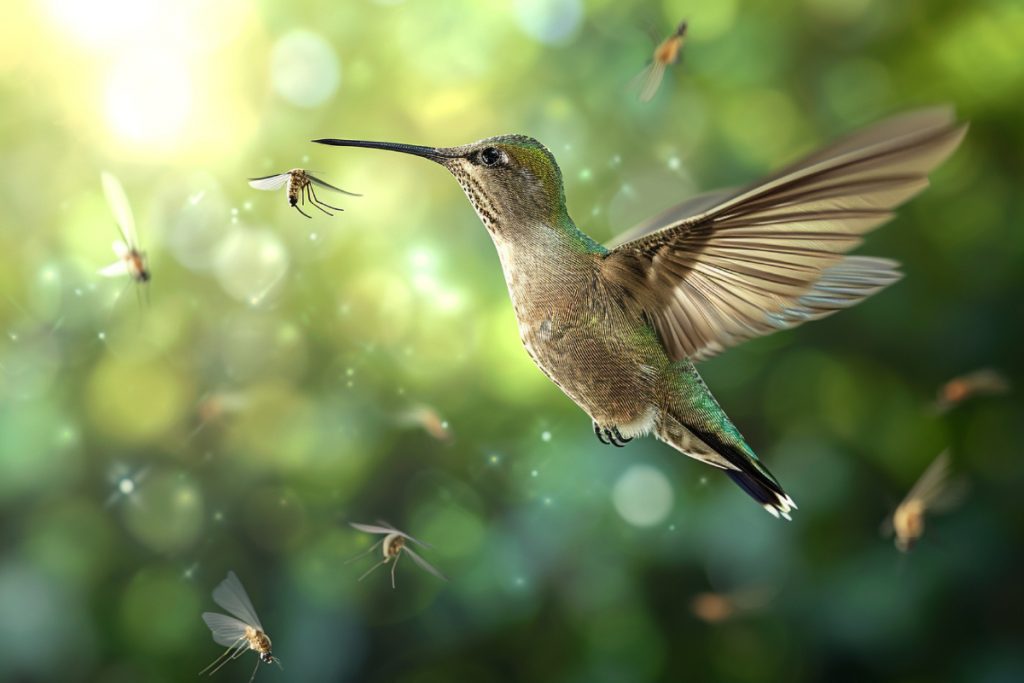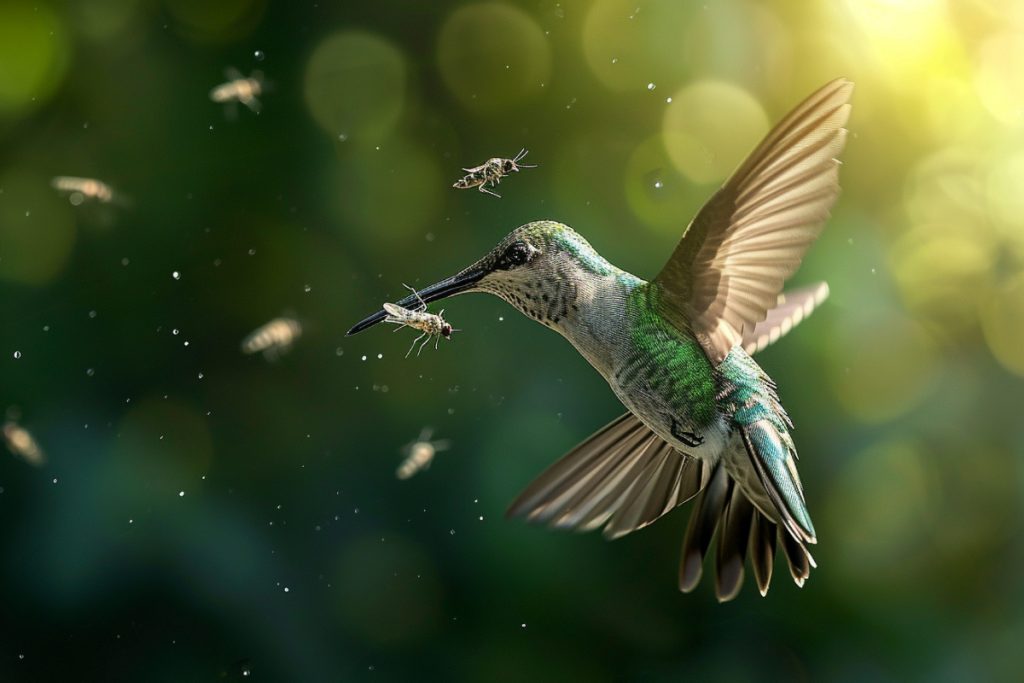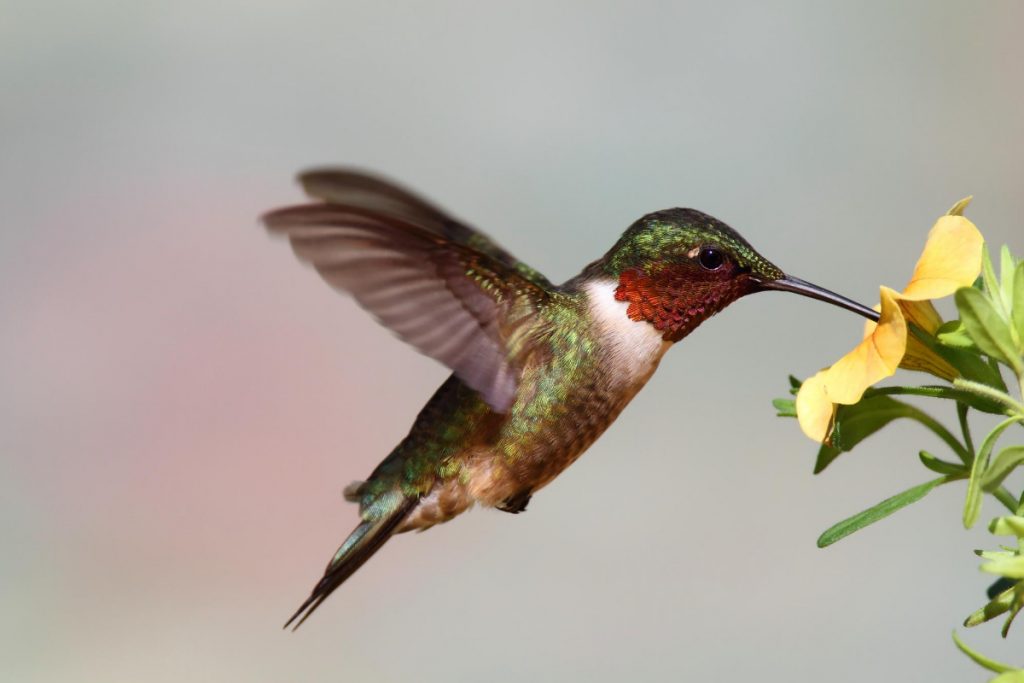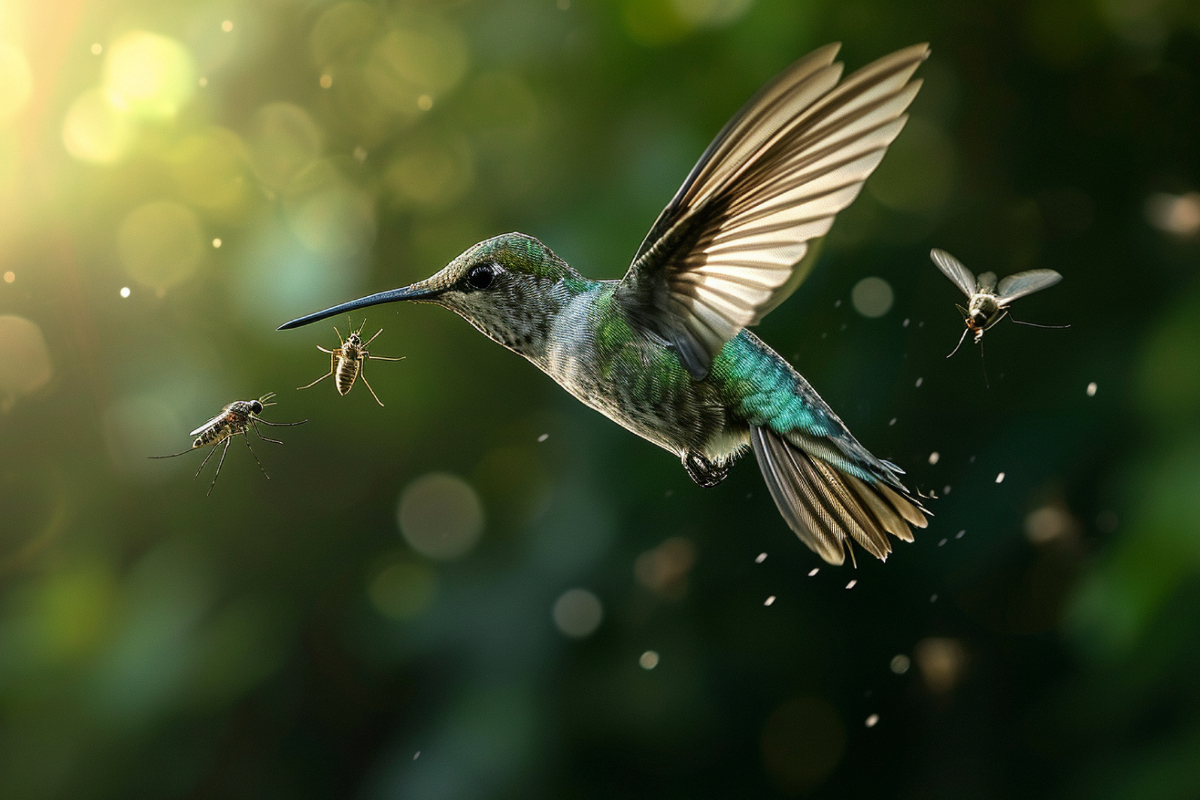Hummingbirds are such delightful little birds. Their iridescent feathers shimmer in the sunlight as they flutter from flower to flower, sipping nectar with their slender beaks. It’s no wonder they have captured the fascination and affection of so many.
But beyond being beautiful, hummingbirds play an important role in our ecosystems. One of those roles? Mosquito control. Yes, it’s true – hummingbirds eat mosquitoes.
In this blog post, we will explore some facts about hummingbirds as insect eaters, how they catch insects like mosquitoes, and whether they make any real dent in mosquito populations. Let’s take a closer look at the mosquito-munching abilities of hummingbirds!
Key Takeaways
- Hummingbirds eat hundreds of insects daily, including mosquitoes, to get protein and nutrients.
- They use their specialised beaks and hunting skills to pluck insects from trees, flowers, spider webs, and out of the air.
- While they eat lots of mosquitoes, hummingbirds likely only make a small dent in populations due to their tiny size.
- Attracting hummingbirds to your yard means fewer mosquito bites for you!

Do Hummingbirds Really Eat Mosquitoes?
Yes, hummingbirds regularly feast on mosquitoes as part of their small insect diet. Hummingbirds have extremely fast metabolisms and need to consume between half to eight times their body weight in nectar and insects each day in order to survive.
While most of their diet comprises sugary nectar and plant juices, hummingbirds get essential protein, amino acids, fats, and other nutrients from eating insects. Mosquitoes are among the insects they eat along with:
- Ants
- Aphids
- Beetles
- Fruit flies
- Gnats
- Spider eggs
- Spider larvae
- Spiders
- Weevils.
Researchers have found that hummingbirds eat anywhere from several hundred up to one thousand insects every single day as part of their regular diet. And mosquitoes are definitely on the menu!
How Do Hummingbirds Catch Mosquitoes and Other Insects?
Hummingbirds have slender pointed beaks perfect for sipping liquid nectar, but how do they use those beaks to eat insects? It turns out their beaks have some special adaptations:
- The tips of their beaks are slightly hooked to help grab insects.
- Their lower beaks can flex and widen up to 25 degrees to create a larger surface area for trapping insects.
- Tiny fringes on their beaks help catch and hold insect prey.
Here are the clever techniques hummingbirds use to hunt down insect snacks like mosquitoes:
- Snatch bugs right out of the air as they fly by
- Pluck insects from leaves and tree bark
- Remove bugs trapped in spider webs – they love spider eggs and larvae, too!
- Grab insects off flowers as they are feeding on nectar.
Their excellent vision, precision flying skills, and specialised beaks allow hummingbirds to feast on mosquitoes virtually anywhere they encounter them outdoors.

Do Hummingbirds Control Mosquito Populations?
Hummingbirds certainly dine on plenty of mosquitoes. But do these tiny birds make any real impact on mosquito populations?
One study in Louisiana tested the mosquito munching ability of young red-eared slider turtles by placing them in ditches filled with mosquito larvae. By the end of the study, the turtle population had reduced the mosquito larvae by 99% – an incredible decline demonstrating how effective some mosquito predators can be.
However, hummingbirds, while very active insect eaters are much smaller than turtles. One tiny hummingbird simply can’t eat enough mosquitoes to reduce the populations of mosquitoes on its own significantly.
That said, in smaller home environments like backyards and gardens, having a resident hummingbird or two regularly feasting on mosquitoes may help reduce bites!
Other larger insect eaters like bats and dragonflies likely have a more measurable effect on mosquito populations overall. But every little bit of natural mosquito control helps!
Attract Hummingbirds to Help Control Mosquitoes
While hummingbirds alone won’t wipe out mosquitoes, attracting these speedy little insect eaters to your yard is a win-win.
Not only are they a joy to watch, but every mosquito meal a hummingbird enjoys is one less that can bite you!
Here are some tips for tempting hummingbirds to visit your yard or gardens often:
- Offer nectar feeders with fresh sugar water – be sure to change it every few days.
- Include vibrant flowers specifically for hummingbirds – trumpet vine, bee balm, and cardinal flowers are some favourites.
- Provide a water feature like a mister or small fountain – hummingbirds love to bathe!
- Eliminate pesticide use, so insects are plentiful for them to eat.
- Set up nest boxes if you’d like the birds to raise their young there.
With a little encouragement, you may find hummingbirds happily nesting on your property all summer, providing free mosquito control service!
Final Thoughts
While hummingbirds alone won’t end the mosquito pest problem completely, they do regularly dine on these blood-sucking insects.
The speed and agility of hummingbirds allow them to catch mosquitoes and other insects easily. You can enlist their help in keeping mosquitoes under control in your backyard by offering a habitat that hummingbirds love, plus nectar feeders.
Watching hummingbird’s glittery wings fluttering through the air, snatching bugs truly never gets old. When it comes to mosquito defence, attracting hummingbirds is a win for your yard and great summer entertainment!

Frequently Asked Questions (FAQs) – Do Hummingbirds Eat Mosquitoes?
Q: What specific types of hummingbirds are known to eat mosquitoes?
A: Various species of hummingbirds, including the Ruby-throated Hummingbird and the Anna’s Hummingbird, are known to include mosquitoes in their diet.
Q: In which geographical regions are hummingbirds that eat mosquitoes commonly found?
A: Hummingbirds that eat mosquitoes are found across the Americas, particularly in regions like the Southwestern United States, Central America, and parts of South America.
Q: How do hummingbirds contribute to the ecosystem beyond mosquito control?
A: Beyond mosquito control, hummingbirds play a crucial role in pollination, helping maintain the health of many flowering plants and ecosystems.
Q: Are there any birds or insects that have a similar diet to hummingbirds?
A: Similar to hummingbirds, some species of bats and dragonflies also have diets rich in insects, including mosquitoes.
Q: What scientific studies support the role of hummingbirds in controlling mosquito populations?
A: Numerous ornithological studies have documented hummingbirds’ insectivorous habits, though direct links to significant mosquito population control are limited due to their small size.
Q: What is the conservation status of mosquito-eating hummingbirds?
A: The conservation status of hummingbirds varies by species, but habitat loss and climate change are general threats affecting many populations.
Q: Do hummingbirds’ feeding habits change with the seasons?
A: Yes, hummingbirds’ feeding habits can change with seasons, often increasing their insect intake during the breeding season for additional protein.
Q: How does human activity impact hummingbirds and their ecological roles?
A: Human activities, such as pesticide use and habitat destruction, can negatively impact hummingbirds by reducing their food sources and nesting sites.
Q: Can you provide a detailed breakdown of a hummingbird’s insect diet?
A: In addition to mosquitoes, hummingbirds eat a variety of insects like gnats, aphids, fruit flies, and small beetles.
Q: What are some tips for observing hummingbirds in the wild?
A: To observe hummingbirds, visit areas with abundant flowers, set up hummingbird feeders, and stay still and quiet to increase your chances of sighting.
Q: Which flowers are best for attracting hummingbirds?
A: Flowers like trumpet vine, bee balm, and cardinal flowers are excellent for attracting hummingbirds due to their nectar content and structure.
Q: Do hummingbirds eat other types of pests besides mosquitoes?
A: Yes, hummingbirds consume various pests, including aphids and spider mites, contributing to pest control in gardens.
Q: How does the hummingbird’s beak adapt for insect consumption?
A: A hummingbird’s beak is slender and sometimes slightly hooked, with a flexible lower mandible, aiding in catching and consuming insects.
Q: Can backyard gardens significantly attract hummingbirds for mosquito control?
A: While a single garden may not attract a large number of hummingbirds, creating a hummingbird-friendly environment can certainly help in attracting these birds for natural mosquito control.
Q: Are there any specific bird feeders recommended for attracting hummingbirds?
A: Nectar feeders designed specifically for hummingbirds, filled with a sugar-water solution, are effective in attracting them to your yard.
Q: How does the presence of water features influence hummingbird attraction?
A: Water features like misters or small fountains are attractive to hummingbirds for bathing and drinking, enhancing the appeal of a garden.
Q: What role do spider webs play in a hummingbird’s diet?
A: Hummingbirds sometimes extract insects like gnats and spider larvae from spider webs, adding variety to their insect diet.
Q: Are there any specific times of day when hummingbirds are most active in hunting mosquitoes?
A: Hummingbirds are generally most active during the early morning and late afternoon, which are also prime times for mosquito activity.
Q: How can the use of pesticides impact hummingbird populations?
A: Pesticides can reduce the number of insects available for hummingbirds to eat and can be directly harmful to the birds if ingested.
Q: What are the benefits of having hummingbirds in urban environments?
A: In urban environments, hummingbirds help in pollination and insect control, contributing to biodiversity and ecological balance.
Useful Links:
Related Posts to Read:
- 25 Hummingbird Behaviors.
- Do Hummingbirds Beaks Open When Feeding?
- 6 Fascinating Facts About Hummingbird Sizes.
- Hummingbird Diet and Nutrition.
- How Much Does A Hummingbird Eat Per Day?
- Do Hummingbirds Eat Bees?
- Do Hummingbirds Eat Wasps?
References:
- About Hummingbird (Link).
- Greenewalt, C. H. (1960). Hummingbirds. New York: Doubleday. Google Scholar.
- Carey C. The impacts of climate change on the annual cycles of birds. Philos Trans R Soc Lond B Biol Sci. 2009 Nov 27; 364(1534):3321-30. doi: 10.1098/rstb.2009.0182. PMID: 19833644; PMCID: PMC2781852.
- Rico-Guevara A, Rubega MA, Hurme KJ, Dudley R. Shifting Paradigms in the Mechanics of Nectar Extraction and Hummingbird Bill Morphology. Integr Org Biol. 2019 Jan 2;1(1):oby006. doi: 10.1093/iob/oby006. PMID: 33791513; PMCID: PMC7671138.
- Tyrrell LP, Goller B, Moore BA, Altshuler DL, Fernández-Juricic E. The Orientation of Visual Space from the Perspective of Hummingbirds. Front Neurosci. 2018 Jan 30;12:16. doi: 10.3389/fnins.2018.00016. PMID: 29440985; PMCID: PMC5797624.
- Hummingbirds Sighting (Journey North Map).
- About Hummingbird’s Characteristics.
